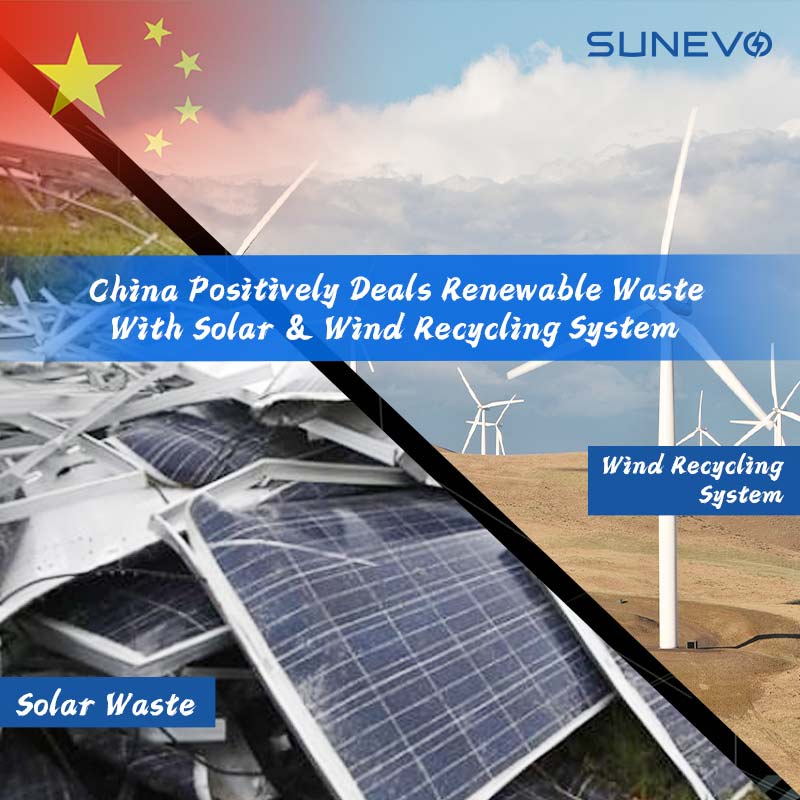

The renewable energy industry in China has been experiencing unprecedented growth over the past decade. This has been largely due to the country's commitment to reducing its dependence on fossil fuels as part of its ambitious environmental goals. As a result, the country is witnessing an increase in the volume of waste generated from solar and wind technologies.
One of the key players in this transition has been the widespread usage of fair-cost solar panels from SUNEVO supplier. With an increasing number of households and businesses opting for these cost-effective and environmentally friendly energy solutions, the issue of managing and recycling this waste is becoming a pressing concern.
This blog post will delve deeper into this issue, exploring the challenges and opportunities in recycling renewable waste. We will also discuss the importance of addressing this issue to promote sustainability and environmental protection, not just in China but globally.
Current Challenges in China
As the world's largest consumer and manufacturer of photovoltaics, China's role in the renewable energy ecosystem is truly significant. The country's commitment to mitigating climate change by ramping up renewable energy utilization is indeed commendable, but it's not without its challenges. One of the main issues it faces is dealing with the escalating amount of solar and wind waste.
Unprecedented growth in China's solar and wind sectors has led to the generation of vast quantities of discarded solar panels and wind turbine parts. This has raised serious concerns about their disposal and the environmental implications if not handled properly. Indeed, without adequate recycling strategies, renewable energy by-products could lead to significant environmental degradation, potentially undoing much of the ecological benefits the country has reaped from transitioning to renewable energy.
China's solution to this looming issue lies in the development and implementation of efficient waste recycling systems for renewable energy waste, as opposed to just disposing of them in landfills or through incineration. In fact, the country has intensively shaped several initiatives in recent years all aimed at promoting effective recycling strategies for renewable waste. The ambitious approach includes the formulation of regulations that mandate the recycling of worn-out solar panels and the establishment of dedicated recycling facilities to handle wind turbine waste.
However, this is just the beginning. The sheer magnitude of renewable waste expected to be generated in the next few years demands a continuous and more stringent effort towards its effective treatment and recycling.
Learning from China's Experience
Besides its own recycling endeavours, China's experiences offer valuable insights and lessons for other countries, particularly the United States. Despite being one of the significant players in the renewable energy sector, the U.S has been lagging behind in investing in a concrete solar recycling revolution. This underscores the pressing need for a country distilling a significant portion of its energy from renewable sources to have a renewable waste management strategy in place.
One of the key lessons the U.S could learn from China's renewable waste management approach is the effectiveness of stringent regulations and regulatory oversight in promoting efficient recycling strategies. The U.S could adopt similar regulations mandating the recycling of worn-out solar panels.
Moreover, setting up dedicated recycling facilities and schemes could ensure better handling of renewable waste. Additionally, a sector-wide push towards the adoption of renewable waste standards, such as those proposed by China, could prove beneficial in pushing the envelope in renewable waste handling and processing.
Highly collaborative partnerships between China and the U.S. could usher in innovative solutions to meet the renewable energy sector's mutual challenges. By strengthening these sorts of ties and sharing knowledge, resources, and expertise, these global leaders could pave the way for enhanced, sustainable waste management solutions for the burgeoning renewable energy industry.
The Road Ahead: Embracing Innovative Recycling Systems
China's commitment to tackling renewable waste issues extends beyond just implementing relevant policies. The country is steadily investing in innovative recycling systems designed to efficiently recycle a substantial amount of solar and wind waste. These innovative recycling solutions underscore China's commitment to achieving a sustainable renewable energy industry.
In particular, China is focusing on establishing recycling programs that emphasize creating a circular economy in the renewable energy sector. This means building systems where waste is not discarded but instead becomes a valuable asset.
Such initiatives are crucial in mitigating the environmental impact of renewable energy production. They not only help to reduce waste but also contribute to the efficient use of resources, promoting sustainability in the process.
Future Prospect
Looking ahead, the recycling of renewable waste is set to become a major focus in both China and the U.S. As more countries embrace renewable energy, the need for effective waste management strategies will become even more pressing.
In this context, the experiences of China and the U.S. could serve as valuable lessons for other countries. These two major economies have made significant strides in renewable energy production, and their experiences in managing and recycling renewable waste could provide valuable insights for other countries looking to follow a similar path.
In conclusion, sustainable waste management practices are crucial in the renewable energy sector. As the world continues to embrace renewable energy, we must also focus on managing the waste generated from these technologies. Moreover, international cooperation is needed to address the environmental challenges posed by the increasing volumes of renewable waste. By working together, we can ensure that the transition to renewable energy is not just sustainable but also environmentally friendly.